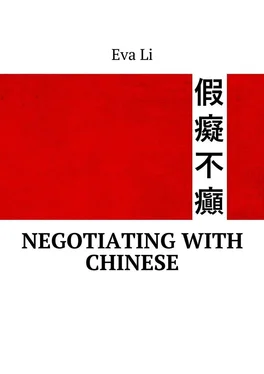Do not load them with several unrelated questions. Stick to one question, one topic, and one letter. This will help avoid any confusion. True, it is hard. But it will be much harder to sort out a whole shipping container of damaged goods, because the Chinese misunderstood something and did everything according to their usual template. Remember that the Chinese think stereotypically, which means the following: you are a barbarian; the best things in the world are Chinese; it is possible to deceive you; they do everything the way they are used to; making changes requires additional thinking, which is tiresome, so it is easier to say, «We can’t do it». Also, always verify and re-verify what they say.
Interaction with the outside world
All civilizations outlived the stage of ethnocentrism, but they either disappeared or changed their opinion along with the world’s geopolitical development, which is why ethnocentrism became obsolete. It is, however, still alive in China. There are three reasons for it.
1. Geography.
China takes up most of Asia. As I have already mentioned, China is geographically isolated from the rest of the world (mountains, sea, desert), which is why the Chinese «stewed in their own juice» for a long time, so to speak.
2. Ideology
In China, the difference between a Chinese and a barbarian has always been highlighted. The Great Wall of China is a material manifestation of the «us and them» distinction.
3. Level of development
China’s cultural level was much more advanced compared to many other Oriental lands’ both in ancient and medieval times.
All this led the Chinese to think of themselves as the Middle Nation, the only cultured and developed country in the world, surrounded by savages and barbarians who need to be civilized.
China’s mission was to establish and maintain a balance between all things and people. This is where the notion of «Sinosphere» is derived from, which was to be accepted by all non-Chinese peoples. China, however, never intended to conquer anyone. The barbarians were supposed to see the beauty of the Chinese culture, to recognize it as the only true one and to accept it willingly as their own.
There were three types of barbarians. The first one included China’s immediate neighbors (Korea, Japan, and Vietnam). The second consisted of nomadic and seminomadic Asian tribes, who sometimes paid tribute to Chinese rulers. The third type comprised the rest of the world, or the so-called «remote barbarians», including us.
China’s attitude towards the barbarians was similar to that of senior to minor, or lord to vassal. They still have a very clear distinction between «Chinese» and «barbarian». By definition, they do not see us as cultured, exalted beings, and they initially do not consider us as equals. This is why upsetting the arrangements made with us, barbarians, is fine with them.
Chinese people still believe that if a day goes by without tricking at least one foreigner, this day is a waste. As a result, they charge us higher prices than they do their fellow Chinese. They will never respect us the way they do each other.
If you have been to China, especially in smaller cities, you may have noticed the Chinese blatantly pointing their finger at you, or taking pictures, or shouting something in your direction. This is because you were some sort of exotic animal they had never seen before. They have always treated barbarians like this, and it is likely they always will.
This tendency is often noticeable during negotiations. If you use English to negotiate, they will quote a higher price than they would if you spoke Chinese. Plus, if you speak their language, they will see you in a totally different light. Your Chinese language skills will not make you their equal, but they will transform you into a proximate kind of barbarian, who has accepted China as the best culture in the world and is doing all he or she can to become civilized. Moreover, if a person knows not only the language, but also the Chinese negotiation technique, his or her success can be tremendous.
So, to open the gates to China, you have to accept that you are a barbarian and a savage willing to become a civilized person with the help of the Chinese culture.
As I have mentioned earlier, the Chinese rely on stereotypes, templates, patterns, and analogies. It is a clear manifestation of the Chinese mentality and their associative thinking. There are two reasons for this.
1. Characters
Psychologists say that Far Eastern countries have a special kind of thinking, formed by the use of characters. One character contains 500 times the information a single Roman or Cyrillic letter does.
2. Ancestor worship, which Confucius cultivated and strengthened in the minds of the Chinese. Ancestor veneration also refers to the ideals of conduct and thinking, which were followed in the past. These ideals are to be followed in the present as well, no changes applied, because all the best is back in the past.
Конец ознакомительного фрагмента.
Текст предоставлен ООО «ЛитРес».
Прочитайте эту книгу целиком, на ЛитРес.
Безопасно оплатить книгу можно банковской картой Visa, MasterCard, Maestro, со счета мобильного телефона, с платежного терминала, в салоне МТС или Связной, через PayPal, WebMoney, Яндекс.Деньги, QIWI Кошелек, бонусными картами или другим удобным Вам способом.












